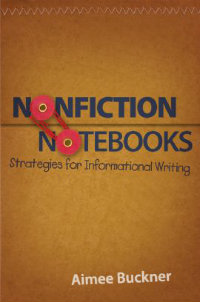Nonfiction Notebooks: Meet the Challenge of Informational Writing
Nonfiction Notebooks: Strategies for Informational Writing
By Aimee Buckner
(Stenhouse, 2013 – Learn more)

Change is good, but sometimes it can be overwhelming at first. The current emphasis that the Common Core has placed on the application of informative and explanatory writing in the classroom may be overwhelming at first to educators. Teachers wonder where the resources will come from? How can they better prepare all students to write all types of nonfiction genres? What about the reluctant writers? Where to begin? Is fiction writing a thing of the past? What about those writer notebooks? What should I do with them?

Buckner writes: “Through a notebook lens, students will be able to see common threads between these kinds of writing. This foundation is crucial as students continue to live in a world where new kinds of writing are appearing every day.” (p. 8)
As I read her book, I realized how much I didn’t learn as a child and wondered how many more students would have shown a passion for writing if their teachers had been like Aimee Buckner.
Nonfiction Notebooks, Strategies for Informational Writing has been my friend, companion, teacher, and guide as I begin to navigate a new nonfiction curriculum. I was introduced to one of Buckner’s books several years ago when I began to teach Readers and Writers Workshop in my fourth grade classroom.
Her book, Notebook Know-How: Strategies for the Writer’s Notebook, helped me to navigate through my first experience with a true Writers Workshop. It helped me maintain my sanity as I navigated through newly charted waters. I also owe my personal notebook collection to her. I have over a dozen now, each filled with memories, narratives, poems, conversations I eavesdropped on at Barnes and Noble, quotes and excerpts from mentor texts. My writers notebooks helped me to develop a love of writing and to become a better writer.
All aspects of nonfiction writing
Now Buckner’s lastest work, Nonfiction Notebooks, travels with me from school to home. Written in the same format as Notebook Know-How, the book explains how writers’ notebooks can help students strengthen their nonfiction writing skills. Buckner takes the angst out of teaching nonfiction and replaces it with confidence. Here’s Buckner describing her goals for this book and how the strategies can help us meet Common Core standards in our classrooms:
If you teach informational writing, this book is for you. In six compact chapters, she covers all aspects of nonfiction writing, from prewriting to publishing.
Chapter 2: Strategies to Explore Topics
Chapter 3: Strategies to Gather Information
Chapter 4: Predrafting Strategies
Chapter 5: Strategies to Craft Informational Pieces
Chapter 6: Assessment
Buckner stresses the importance of the prewriting process and each step of the writing process. In the opening chapter, “Writers Notebooks, An Informational Twist,” she describes how notebooks are used to develop seed ideas and how students can revisit them to support their craft and revision.
Buckner is no stranger to the classroom. Writing as if she were talking with you face to face about her day at work, she shares stories and strategies that she used to help her own upper elementary students with informational writing (reports, articles, essays, etc.) As you read each chapter, you notice that Buckner is a real teacher. She shares her struggles and successes. “My students nod. I can see that I’ve lost them a bit on that last part, but I trudge on so I can clarify and get them off to their writing.”
As I read each chapter, I felt as if I was sitting in Ms. Buckner’s classroom, watching a great teacher in action. I could sense her enthusiasm as her students asked questions, fidgeted as she explained a concept, became engaged in the writing process, and developed a desire to become better writers. I could hear her quiet chuckle as George asked the question, “How do we know what we don’t know?”
Lots of examples and student work
There is a definite focus but smooth flow to the lessons in the book. In the chapter “Strategies to Craft Informational Pieces,” she introduces the students to writing in slow motion (or step-by-step). Another helpful revision strategy she shares is “Over the Shoulder Writing,” having students identify places where their writing might be confusing to the reader and strategies to use to help during the revision process.
What is extremely helpful to the teacher are the student examples. Actual student work is provided, along with a short blurb to explain the example and supplemental notes.
Ready for immediate use
Nonfiction Notebooks is a book that can be put to use immediately, as I did. It includes ideas that can be used alongside today’s lesson or saved in your mental file cabinet. I would recommend this book to education colleges as required reading for students interested in teaching at any K-8 grade and any subject. I would also recommend it to teachers who would like to begin a professional book club around the topic of nonfiction writing across the curriculum.
Aimee Buckner is always entertaining and engaging, and her book will travel with you back and forth to work. Unless, of course, you bought two copies like I did, one for home and one for school!
Linda Biondi is a fourth grade teacher at Pond Road Middle School in Robbinsville, NJ, and a recipient of several educational grants that infuse a literacy enriched curriculum with an understanding of individual learning styles to help students understand bias and patterns of discrimination. She is a Teacher Consultant with the National Writing Project and a participant on the NJ Department of Education Teacher Advisory Panel.

































